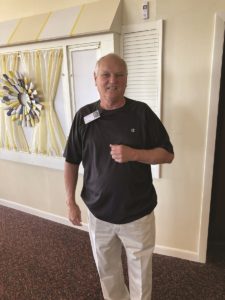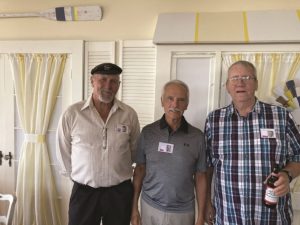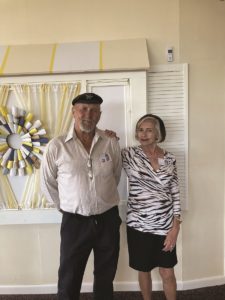PROVINCETOWN — Stephen DeRiggs, a Provincetown High School junior, was getting off the ferry the day before the annual Nantucket-Provincetown football game when he heard the news. The president had been shot.
It was Friday, Nov. 22, 1963. The game the next day in Nantucket was one of only two in the state that were played that weekend.

Back home on the day after, a Sunday, DeRiggs saw Jack Ruby shoot Lee Harvey Oswald on national television.
On June 23, 13 members of the Provincetown High School Class of 1965, including Stephen DeRiggs, gathered at the Provincetown Inn for their 56-year reunion. Those 13 made up exactly one quarter of the graduates, who numbered 52 that year. Their stories illuminate the tumultuous history of their coming-of-age years.
Fifteen months after President Kennedy’s assassination, on Feb. 21, 1965, Malcolm X was murdered. That summer, riots broke out in Los Angeles; the following year, riots erupted in Newark and Detroit. On April 4, 1968, Martin Luther King Jr. was assassinated, followed on June 6 by Robert Kennedy.
The Stonewall riots started on June 27, 1969.
Meanwhile, the Vietnam War intensified, with more American troops and mounting public opposition. In 1963, draft cards were burned in protest for the first time. Protests spread on college campuses, and four students were killed by the National Guard at Kent State University in Ohio on May 4, 1970.
Provincetown’s Class of 1965 may have appeared to be, as DeRiggs said, “a little insulated” from racial and other traumas. But the class developed resilience — born of a culture of work and a deep sense of community. “There may have been a cloud over things,” he said, but he knew he had to get on with living.
Partly in response to the world he graduated into, DeRiggs went on to college and devoted the four years after that to working for the Bureau of Indian Affairs as a teacher on reservation schools. Forty years of teaching history and psychology in public schools in Pennsylvania and other states followed.
Paul Mendes, another member of the class, had grandparents who came from Portugal to Provincetown in the early 1900s. His father was captain of the Leona and Gabriel, a fishing boat. Mendes’s parents, John and Leona Mendes, also operated the Long Point View Guest House seasonally from 1946 until 2001. “They taught me family values that have sustained me to this day,” Mendes said.
Post-Vietnam Service
“What was happening in Vietnam upset me,” said Mendes. He had set out to study business, but instead, in Boston, “I walked down to the U.S. Marine recruiter and signed up for four years.”

Mendes told the recruiter he was interested in guns, and the sergeant assured him the Marine Corps had lots of them. “That is how I ended up a weapons specialist,” Mendes said. But making and losing friends in the war had a profound impact.
“Upon returning from Vietnam in August 1967, I sold my guns and only fired once a year as required for a police officer,” he said.
An interview with Provincetown Police Chief James Meads in 1970 launched Mendes’s career as a police officer, “a career that I loved,” he said.
That same year, he said, “I saw the woman who would become my wife, Victoria Andrews.” She, too, had been a classmate, “but we never talked much,” Mendes said. In 10 days, the couple were engaged. They now have two grown sons.
In a class with 31 male graduates, six enlisted in the military and subsequently had long careers in the Provincetown Police Dept. One of those six, Robert Russell, commented that they were “the last generation to stay in such numbers to serve the town.”
Adventure and Privilege
Elizabeth Perillo’s last name was Lema when she was growing up in Provincetown. “After our daily chores,” she said, “we kids were left on our own with the only rule being to get home before dark.” Her adventures included making the day-long 20-mile bike ride to Wellfleet, provisions intact.
“I’m told there was discrimination against the Portuguese at some point, but I never noticed,” Perillo said. “I mean, there were the older high school girls who threatened to dunk us freshwomen in the rest rooms of town hall. They dragged us there, but never went through with it.”

Perillo was aware instead of her privilege. “After all,” she said, “the Portuguese fishermen and their families were the wealthiest folks in our town.” She remembers her high school years as the best years of her life.
After graduation, Perillo went to work for the Cape Cod National Seashore, and, in 1967, was transferred to the Dept. of the Interior in Washington, D.C. She remembers protests following Martin Luther King’s assassination, and what it felt like to walk through a crowd and feel the protests turn violent. “That was the beginning of maturity,” she said.
Listening in on a day’s worth of stories revealed the class consensus on one most-fondly-remembered event. It was the time the high school basketball team won the Class D state championship at Boston Garden.
Stephen DeRiggs was a key player in that group, which he described as a “small, quick team” with no player taller than six feet. They won the semi-final game by one point, showing the “grit,” DeRiggs said, that characterized the team. The students called the players “the iron men.” At the final, it seemed to DeRiggs, the whole town was there, and when the team won, the crowd rushed back to Provincetown to prepare a celebratory dinner.
Back at the Garden, however, some players from the Celtics congratulated the team in the locker room and the team decided to stay on to watch the Class B final.
Those preparing the celebratory dinner gave up on waiting for the team’s return — there was no celebratory dinner.
Editor’s note: An earlier version of this story was published with the subhead “12 classmates gather…” There were 13.



